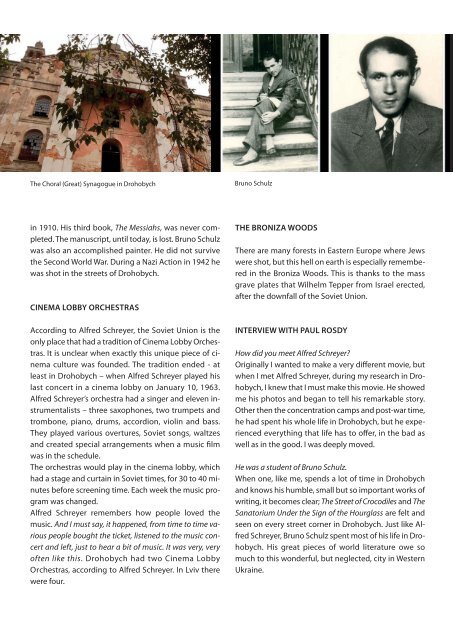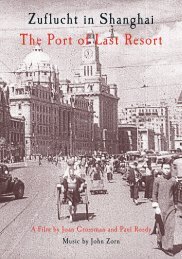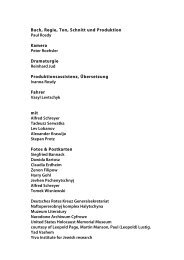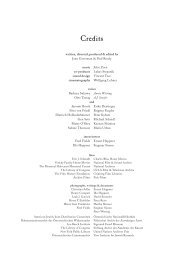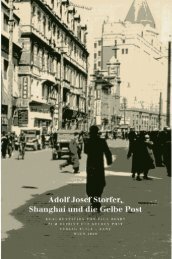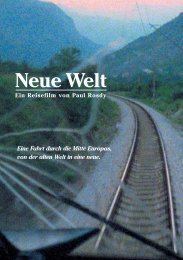The Last Jew from Drohobych Alfred Schreyer - rosdy film kg
The Last Jew from Drohobych Alfred Schreyer - rosdy film kg
The Last Jew from Drohobych Alfred Schreyer - rosdy film kg
- No tags were found...
Create successful ePaper yourself
Turn your PDF publications into a flip-book with our unique Google optimized e-Paper software.
<strong>The</strong> Choral (Great) Synagogue in <strong>Drohobych</strong>Bruno Schulzin 1910. His third book, <strong>The</strong> Messiahs, was never completed.<strong>The</strong> manuscript, until today, is lost. Bruno Schulzwas also an accomplished painter. He did not survivethe Second World War. During a Nazi Action in 1942 hewas shot in the streets of <strong>Drohobych</strong>.CINEMA LOBBY ORCHESTRASAccording to <strong>Alfred</strong> <strong>Schreyer</strong>, the Soviet Union is theonly place that had a tradition of Cinema Lobby Orchestras.It is unclear when exactly this unique piece of cinemaculture was founded. <strong>The</strong> tradition ended - atleast in <strong>Drohobych</strong> – when <strong>Alfred</strong> <strong>Schreyer</strong> played hislast concert in a cinema lobby on January 10, 1963.<strong>Alfred</strong> <strong>Schreyer</strong>’s orchestra had a singer and eleven instrumentalists– three saxophones, two trumpets andtrombone, piano, drums, accordion, violin and bass.<strong>The</strong>y played various overtures, Soviet songs, waltzesand created special arrangements when a music <strong>film</strong>was in the schedule.<strong>The</strong> orchestras would play in the cinema lobby, whichhad a stage and curtain in Soviet times, for 30 to 40 minutesbefore screening time. Each week the music programwas changed.<strong>Alfred</strong> <strong>Schreyer</strong> remembers how people loved themusic. And I must say, it happened, <strong>from</strong> time to time variouspeople bought the ticket, listened to the music concertand left, just to hear a bit of music. It was very, veryoften like this. <strong>Drohobych</strong> had two Cinema LobbyOrchestras, according to <strong>Alfred</strong> <strong>Schreyer</strong>. In Lviv therewere four.THE BRONIZA WOODS<strong>The</strong>re are many forests in Eastern Europe where <strong>Jew</strong>swere shot, but this hell on earth is especially rememberedin the Broniza Woods. This is thanks to the massgrave plates that Wilhelm Tepper <strong>from</strong> Israel erected,after the downfall of the Soviet Union.INTERVIEW WITH PAUL ROSDYHow did you meet <strong>Alfred</strong> <strong>Schreyer</strong>?Originally I wanted to make a very different movie, butwhen I met <strong>Alfred</strong> <strong>Schreyer</strong>, during my research in <strong>Drohobych</strong>,I knew that I must make this movie. He showedme his photos and began to tell his remarkable story.Other then the concentration camps and post-war time,he had spent his whole life in <strong>Drohobych</strong>, but he experiencedeverything that life has to offer, in the bad aswell as in the good. I was deeply moved.He was a student of Bruno Schulz.When one, like me, spends a lot of time in <strong>Drohobych</strong>and knows his humble, small but so important works ofwriting, it becomes clear; <strong>The</strong> Street of Crocodiles and <strong>The</strong>Sanatorium Under the Sign of the Hourglass are felt andseen on every street corner in <strong>Drohobych</strong>. Just like <strong>Alfred</strong><strong>Schreyer</strong>, Bruno Schulz spent most of his life in <strong>Drohobych</strong>.His great pieces of world literature owe somuch to this wonderful, but neglected, city in WesternUkraine.


